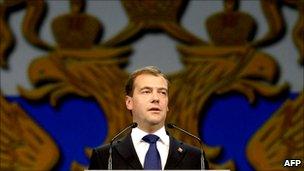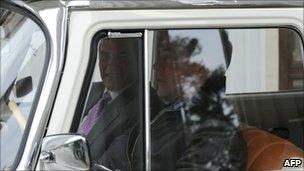Hague visit will test whether Moscow ice is melting
- Published
Britain is the latest Western nation to sense that the mood in Moscow has changed in recent months.

While Putin was into macho, Medvedev is into modernisation
A visit there this week by the Foreign Secretary, William Hague, his first since taking this office, is expected to be followed by a meeting between Prime Minister David Cameron and President Dmitry Medvedev.
Britain, with a couple of unresolved problems with Moscow and an election just passed, is playing catch-up.
President Barack Obama pressed the "reset" button with Russia some time ago and a flurry of Russian contacts with other European countries will culminate in a summit between France, Germany and Russia in the French resort of Deauville later this month.
The man to watch
It is President Medvedev who is the key figure in all this. If Prime Minister Putin is into macho, imposing control over society and posing for pictures bare-chested and with bikers, the president is into modernisation.
He knows that the Russian economy is too lop-sided and oil-dependent. To change that, he needs Western help.
"Since the [war with Georgia in 2008], Russian foreign policy has begun to swing back toward cooperation with the West... Its fundamental premise is the belief that Russia needs better relations with the wealthy world," writes Jeffrey Mankoff, of the Council of Foreign Relations in New York, in September's edition of Foreign Affairs, external.
"Medvedev's new foreign policy strategy essentially argues that Russia's limited influence is a direct result of lack of global competitiveness."
Co-operation
There have been signs of Russian co-operation of late.
It agreed to new UN sanctions on Iran and abided by them by promptly cancelling the sale of an anti-missile defence system to Iran. It has referred a dispute with Norway over Arctic boundaries to the UN.

The road to modernisation - Russia is hoping for help from Silicon Valley
And modernisation is why the president went to California this year and why the governor of California Arnold Schwarzenegger was seen on the Moscow metro this week as part of a return visit which President Medvedev hopes will result in Silicon Valley help for a high-tech industrial park he is setting up.
The British government, giving a new priority to commercial interests in its foreign policy, wants to join this party and it is now clearly in the interests of both governments to put their differences to one side and concentrate on the main menu.
Two problems
These differences are the row over the murder by poisoning in London of Russian exile Alexander Litvinenko for which Britain wants Andrei Lugovoi extradited to stand trial and the closure of British Council offices in all but Moscow.
British officials have indicated that Mr Hague will raise them but will not press these problems too hard.
Instead, as with the French, whose President Nicolas Sarkozy had a successful commercial foray into Russia earlier this year, selling them a couple of amphibious landing ships, the British seek to, as one official put it, "work with the grain" of the modernisation policy.
In the British case, this means offering expertise for what is called the "knowledge economy". This will include, for example, giving advice on developing Moscow as a financial centre.
The Russians are also soft-pedalling on differences. President Medvedev himself will meet Mr Hague as a sign of good intentions.
Ice melting?
Does this mean that the Moscow ice has melted?
Not entirely. Intelligence contacts between Britain and Russia are admitted by Britain to be "not good" though a start on improvement will be attempted by encouraging Russia to help stop drug flows from Afghanistan.
The US, supported as usual by the UK, is worried that Russia, having lost its battle to stop the expansion of Nato, still wants to detach the US from Europe by proposing a new security pact in Europe. [Update: An academic reader has pointed out that Russia has not "lost its battle to stop the expansion of Nato" because Ukraine and Georgia have been blocked. I agree that the sentence was too strong and should have defined that "battle" more closely, in which Russia did lose much ground.]
This could give Moscow greater influence over its so-called "near-abroad", that is the countries that border it.
This worries Washington and London, as well as many of the countries sharing a border with Russia.
British officials are concerned about some of the noises coming from Paris about Mr Sarkozy's desire to have a closer security relationship with Russia.
These officials repeat the three rules drawn up by Nato for talks with Russia on security - the US must not be excluded, Nato must not be undermined and there can be no veto. The smoke signals from Deauville will be carefully watched.
And, of course, if Mr Putin returns one day as president, all this could be slowed down.
Paul.Reynolds-INTERNET@bbc.co.uk
- Published15 September 2010